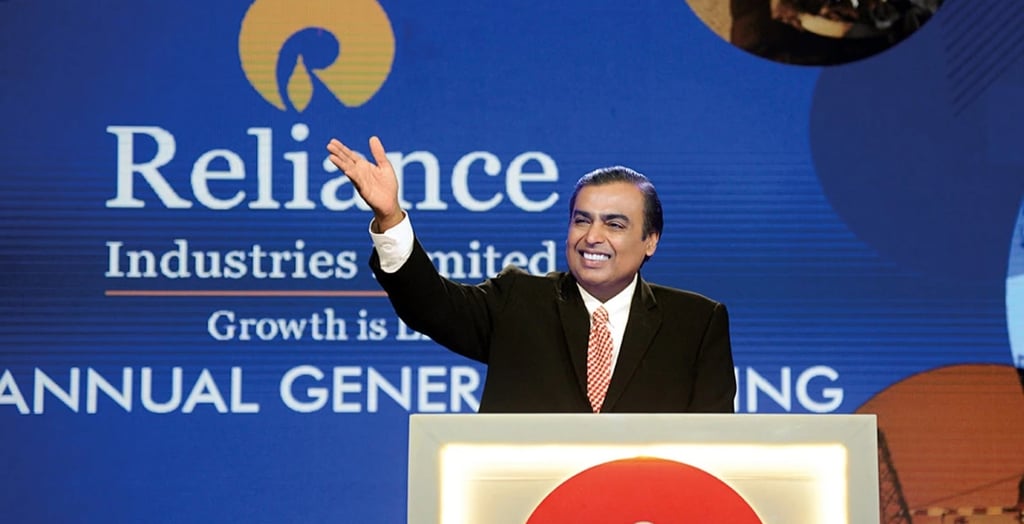Mukesh Ambani: Is Reliance Building an Empire—Or “Owning” India?
Ambani’s Reliance: Building a convenient empire or quietly owning the future of India?
4 min read


Mukesh Ambani’s Reliance Industries Limited (RIL) has long been a powerhouse in India’s business landscape. But what sets it apart today is not just its size—it's the sheer breadth of its reach. Reliance isn’t simply competing in markets; it’s crafting an all-encompassing ecosystem that touches almost every aspect of daily Indian life. While many hail Ambani’s vision as pioneering and transformative, there’s a growing chorus questioning the implications of one company’s dominance across so many sectors. Is Reliance empowering India, or quietly owning it?
Beyond Competition: When a Brand Becomes an Ecosystem
Mukesh Ambani’s strategy transcends conventional business rivalry. Instead of merely competing in each sector, Reliance aims to integrate vertically and horizontally across an array of industries, ensuring it controls multiple consumer touchpoints. This means that for many Indians, Reliance is no longer just another brand—it’s the invisible infrastructure supporting everything from what they eat to how they communicate.
To illustrate, consider the journey of an average Indian consumer who uses Reliance’s services across different daily needs:
Telecommunications: Jio revolutionized the Indian telecom sector by making mobile data affordable and ubiquitous, disrupting incumbents and building an extensive 4G (and now 5G) network.
Retail: Reliance Retail has grown into the largest retail player in India, with supermarkets, convenience stores, and specialty outlets under the umbrella of Reliance Fresh, Reliance Smart, and more.
E-commerce: JioMart directly challenges established online marketplaces, blending digital convenience with Reliance’s logistics infrastructure.
Media and Entertainment: Reliance owns considerable content platforms like JioCinema and has stakes in network broadcasters and digital media companies.
Consumer Goods: Through acquiring legacy brands like Campa Cola and entering packaged foods, Reliance has positioned itself as a major FMCG player.
Financial Services: JioMoney and Reliance’s foray into digital payments and financial products integrate seamlessly into its consumer offerings.
Energy and Infrastructure: Reliance remains a dominant force in oil and petrochemicals, while investing heavily in clean energy alternatives, contributing to India’s energy transition.
Does Monopoly Masquerade as “Progress”?
At first glance, Reliance’s expansive portfolio seems like a boon for consumers. The aggressive pricing strategy of Jio led to dramatically cheaper mobile data; Reliance Retail offers a wide range of products at competitive prices; and JioCinema brings diverse entertainment to affordable devices.
But the rapid expansion raises critical concerns:
Squeezing Out Competition: Small and medium enterprises (SMEs) struggle to compete with the scale, pricing, and distribution power of Reliance. Traditional kirana stores and local retailers face an existential threat.
Market Concentration: When one conglomerate controls telecom, retail, media, and consumer goods, it can influence pricing, content availability, and consumer choice in ways that go beyond healthy competition.
Influence on Public Opinion: Owning media platforms enables Reliance to shape narratives, potentially limiting diverse viewpoints or critical voices.
Data Control and Privacy: With digital payments, telecommunications, and e-commerce all under one roof, concerns over user data privacy and monopoly over consumer information become paramount.
The Reliance Playbook: More Than Business as Usual
Reliance’s empire-building strategy involves vertical integration—owning the supply chain end to end—and horizontal expansion across sectors:
Telecom + Digital Services: Jio and JioMart create an unbeatable combination—digital connectivity combined with retail services. Consumers get seamless experiences, but it’s locked within Reliance’s ecosystem.
Retail + FMCG: Reliance sources, packages, and sells its own food and beverage brands, such as Campa Cola, creating synergies that rival multinational consumer goods giants.
Media + Advertising: Investments in media companies give Reliance influence over advertising channels and content distribution.
Financial Ecosystem: Digital wallets (JioMoney) and payment platforms integrate commerce, telecom bills, and retail shopping into one unified experience.
This synergy has made Ambani’s Reliance more than a company—it’s a market-dominating platform that shapes how millions live, spend, work, and consume.
Consumer Benefit—or Consumer Trap?
The convenience offered is hard to overlook. Consumers can shop, pay bills, stream movies, and connect with loved ones—all within Reliance’s ecosystem, often at lower costs than alternatives.
However, the flipside is the risk of over-dependence—a scenario where consumer choices narrow because alternatives struggle to compete or don’t exist at scale. If Reliance decides to raise prices, limit product offerings, or control content access, consumers might have little recourse.
Moreover, startups and entrepreneurs find it an uphill battle to break into markets dominated by such a vast and deeply integrated network. Innovation could suffer under the shadow of a single, overwhelmingly dominant player.
The Big Question: Can One Man’s Empire Serve a Billion Dreams?
Mukesh Ambani’s vision has undoubtedly transformed India’s economy, driving infrastructure development and digital inclusion at lightning speed. But as the Reliance ecosystem grows, so do concerns:
Are India’s markets becoming too centralized?
What does it mean for democracy, free press, and consumer rights when a single conglomerate owns critical information and communication channels?
Will regulatory frameworks keep pace with such unprecedented corporate expansion?
How do we preserve entrepreneurial diversity and ensure fair competition in the age of platform monopolies?
Conclusion: A Modern Maharajah or Guardian of Growth?
Mukesh Ambani has crafted a business empire that is singular in scale and scope, offering unprecedented convenience and access to millions of Indians. Yet, as Reliance ventures to “own” more sectors—from telecommunications, retail, and media, to FMCG, finance, and energy—the boundary between business dominance and monopoly blurs.
This evolving landscape demands vigilant public debate and thoughtful regulation to ensure that innovation, consumer choice, and market fairness are preserved. The future of India’s diverse economy depends on balancing the benefits of scale and integration with safeguarding competitive spirit and plurality.
What’s your take? Is Reliance the visionary architect of India’s modern economy, or is it a business behemoth quietly owning more than just markets? Share your thoughts—because in Ambani’s India, the stakes couldn’t be higher.
